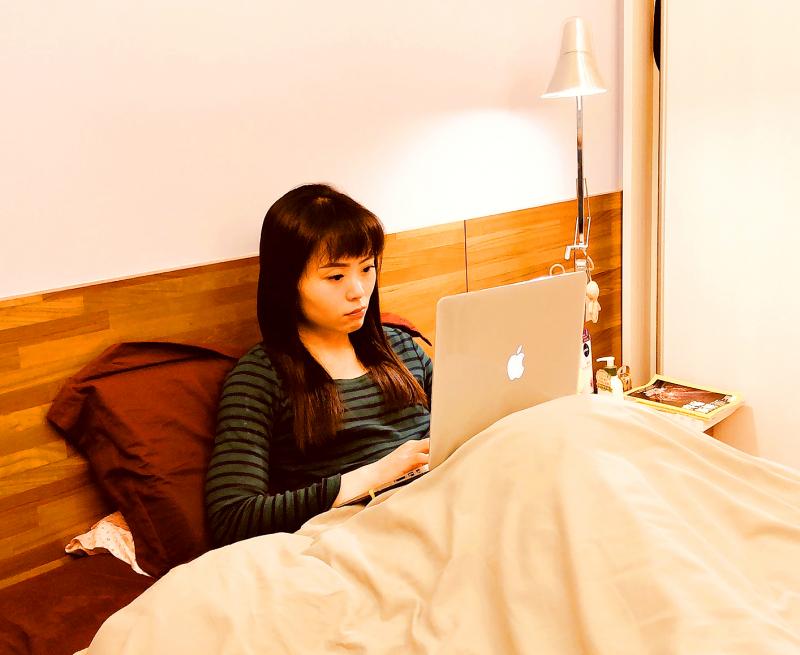Sleep problems are a common feature of our modern lifestyles. However, according to Chinese medicine, a good night’s sleep is all about timing, and it is important to pay attention to how you feel directly after waking up. If you feel full of beans without any drowsiness, this shows that you have had sufficient rest and have slept well.
How many hours’ sleep should you be getting each night? According to Wang Sung, attending physician at Asia University Hospital’s Department of Chinese Medicine, there is no magic number. However, as a general principle, between six to eight hours is sufficient. Wang adds that rather than focusing on the number of hours per night, it is more important to ensure that you are asleep between 11pm and 3am. This time window is the optimum time for sleep because the body enters a deep restive state, which allows it to repair itself and recover from the day’s exertions, Wang says.
If you are someone who often still feels tired after waking up in the morning, constantly feel that you haven’t had enough sleep or have suffered disruptive sleep for over one month, Wang recommends seeing a doctor for a check-up and treatment.

照片:自由時報記者廖雪茹 Photo: Liao Hsueh-ju, Liberty Times
Many people who lead busy or stressful lives suffer from sleep deprivation or poor quality sleep and as a result take a midday nap, or catch up on sleep at the weekend. Wang stresses that a midday nap should be limited to no more than half an hour, otherwise you may find it difficult to get to sleep or sleep fitfully.
Wang also says that, according to Chinese medicine, people should eat meals of equal size at regularly-spaced intervals throughout the day. Immoderate consumption of food and drink coupled with excessive sleep, such as having a big sleep-in at the weekend, is similar to overeating: it will disrupt your biological clock and cause your internal organs to malfunction. Wang likens this to a business that keeps changing its operating hours and internal regulations: its employees will be left at sixes and sevens. This is why using the weekend to catch up on your sleep will not only still leave you feeling fatigued, but as with an extended midday nap, it will put back the time you go to bed at night.
Wang suggests four ways to improve the quality of your sleep:
1. Maintain a good sleeping environment: Your bedroom should be dark without any bright light, the temperature should be neither too hot, nor too cold, and your mattress should be comfortable.
2. Engage in gentle activity before sleep and avoid doing anything that could excite your emotions. Some people over-stimulate themselves before sleeping by watching exciting films or TV programs. You should also avoid using electronic products, such as smartphones, tablets and computers, before sleep because the blue light emitted from screens has been proven to disrupt sleep.
3. Avoid using stimulants such as tobacco, alcohol, coffee, tea or any medicines that could affect your sleep.
4. Regular exercise will help you to fall asleep more easily. However, you should avoid exercising too close to bedtime: the post-exercise high will over-stimulate your body and may prevent you from falling asleep.
(Translated by Edward Jones, Taipei Times)
面對現代人睡眠問題多,中醫師認為,只要睡的時間對,睡醒後感覺精神飽滿,不會嗜睡,就表示有充分休息,睡好覺!
亞洲大學附屬醫院中醫科主治醫師王崧認為,睡眠時間長短並沒有一個定見,以六到八小時為原則即可,重要的是,在晚上11點到凌晨3點是最適合睡覺的時間,在這段時間有一個深度睡眠,讓身體休養生息。
王崧提醒,如果常常睡醒後,仍覺得疲倦、睡不飽等睡眠困擾超過一個月,可以就醫接受檢查與治療。
許多人平常工作忙碌或壓力大,出現睡眠不足、睡不好等情形,而會利用中午休息時間或週末假日補眠,但王崧強調,午睡時間應控制在半小時以內,不可太長,免得晚上不好睡,讓睡眠品質更差。
他也強調,中醫講求生活規律,吃飯要定時定量,不可以暴飲暴食,「假日補眠」如同「睡眠暴食」,會打亂生理時鐘,讓臟腑運作不規律,就像一家公司如果天天都在改變工作時間和規則,員工會無所適從一樣,所以假日補眠沒辦法有效消除疲累感,反而會像午睡時間太長的問題一樣,造成睡眠延遲。
如何睡好覺?王崧建議有4個方法:
1.良好的睡眠場所:房間要暗,不能太亮,室溫不要太熱或太冷,以及床墊要舒適。
2.睡前活動要溫和,避免情緒激動:有些人睡前會看較刺激的影片或節目,結果情緒太過亢奮,也應避免3C產品,因為藍光會影響睡眠是已經確定的。
3.避免使用刺激性物質:抽菸、喝酒、咖啡、茶飲及部分藥物都可能會影響睡眠。
4.運動:培養良好的運動習慣會比較好入睡,但運動時間若離睡眠時間太近,小心會過度興奮,睡不著。
(自由時報記者羅碧)

★ Bilingual Story is a fictionalized account. 雙語故事部分內容純屬虛構。 “Any New Year’s resolutions?” he asked. Lena put her coffee down. “Yeah,” she said. “To get in shape.... round is a shape, right?” Mark chuckled. “I support this. Fully achievable. Low risk.” “Thanks,” she smiled and lovingly rubbed her round belly. “I like a resolution I can’t fail.” “Funny thing is, I was thinking about getting round too.” Lena nodded her head in approval, “You could put some meat on those skinny bones of yours.” Mark shook his head, “Not that kind of round. Wheel-of-Life round.” She raised an eyebrow.

詞法—不定詞的誤用 1. 我得記住星期五要把報告寫好。 ˇ I must remember to finish my report by Friday. χ I must remember finishing my report by Friday. 註︰remember 後面跟動名詞或不定詞表示兩種不同的概念,與 forget 相類似。 試比較下列句子: I remember meeting him somewhere.(我記得曾經在某處見過他。) I must remember to meet him at the station at six this evening. (我必須記住今晚六點得去車站接他。) He remembered turning off the light when he left the room. (他記得離開房間時曾先把燈熄了。) Remember to turn off the light when you leave the room. (記住離開房間時要把燈關了。) 2. 他提醒她做好她份內的事。 ˇ He reminded her to do her job. χ He reminded her of doing her job. 註︰remind ... of ... 後面跟動名詞,表示「使人想起做過某事」。若是「提醒某人應做某事」,應用 remind ... to do ...。試比較下列句子: He reminded me of my attending the lecture last Friday. (他讓我想起我上星期五去聽過那次演講。) He

Skating is a popular recreational and competitive activity that involves sliding over surfaces using specially designed footwear. Its origins date back over 1,000 years to Northern Europe, where people first strapped animal bones to their feet to move across frozen lakes and rivers. In the 17th century, the Dutch transformed skating into a leisure activity. They also replaced bone blades with metal, leading to the creation of modern ice skates. Today, ice skating is enjoyed as a global sport and an exciting pastime by people of all ages. Figure skating is one of the best-known and most graceful forms of skating.

對話 Dialogue 清清:最近天氣越來越冷,感覺很容易感冒,要不要一起去吃薑母鴨或是羊肉爐? Qīngqing: Zuìjìn tiānqì yuèláiyuè lěng, gǎnjué hěn róngyì gǎnmào, yào bú yào yìqǐ qù chī jiāngmǔyā huòshì yángròulú? 華華:最近我覺得有點累,想吃薑母鴨,可是又怕一下子吃太補會上火。 Huáhua: Zuìjìn wǒ juéde yǒudiǎn lèi, xiǎng chī jiāngmǔyā, kěshì yòu pà yíxiàzi chī tài bǔ huì shànghuǒ. 清清:那我們去喝香菇雞湯吧,不太容易上火,喝了也會很暖和。 Qīngqing: Nà wǒmen qù hē xiānggū jītāng ba, bú tài róngyì shànghuǒ, hē le yě huì hěn nuǎnhuo. 華華:聽起來不錯!你們家平常冬天都吃什麼進補? Huáhua: Tīng qǐlái búcuò! Nǐmen jiā píngcháng dōngtiān dōu chī shénme jìnbǔ? 清清:我家都煮麻油雞,吃完整個人手腳都會熱起來。我也很久沒喝香菇雞湯了,正好可以去打打牙祭。 Qīngqing: Wǒ jiā dōu zhǔ máyóujī, chī wán zhěnggè rén shǒujiǎo dōu huì rè qǐlái. Wǒ yě hěn jiǔ méi hē xiānggū jītāng le, zhènghǎo kěyǐ qù dǎ dǎ yájì. 華華:可是我最近在減肥,會不會吃得太補,肉又長回來了? Huáhua: Kěshì wǒ zuìjìn zài jiǎnféi, huì bú